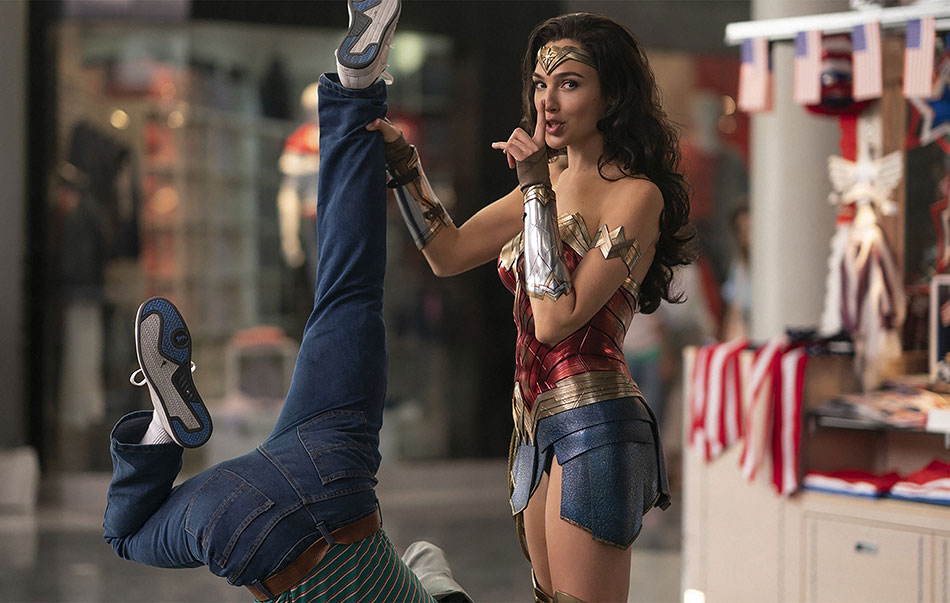Cover Story: Breaking Windows
Five things to know about WarnerMedia’s new day-and-date movie release strategy

The smarter way to stay on top of the multichannel video marketplace. Sign up below.
You are now subscribed
Your newsletter sign-up was successful
WarnerMedia’s pledge to release the entire 2021 Warner Bros. film slate to HBO Max customers at no additional charge is expected to give a needed boost to the service and could smooth the path toward an all-streaming future for entertainment content.
Warner Bros. will release all 17 films it had scheduled for a 2021 release, including potential blockbusters Dune and The Matrix 4, to HBO Max, the $14.99-per-month streaming service that has been somewhat of a disappointment since its May 27 launch. The news came just weeks after the media conglomerate said it would release the tentpole movie Wonder Woman 1984 on HBO Max and in theaters simultaneously on Dec. 25. Just like the Wonder Woman release, the 2021 slate will be available both in theaters and on HBO Max for 30 days, reverting to theatrical-only distribution after that period.
The studio has said the day-and-date changes will only be for one year — fueled in part by COVID-19, which has forced thousands of movie theaters across the country to close their doors. Many, though, believe it will be increasingly difficult to return that genie to the bottle.

Most in the industry had predicted this day was coming for years. Theatrical windows have been consistently shrinking, from the years or several months between theatrical and pay TV release in the 1980s to mere weeks in the past few years. The pandemic, which since March has forced theater closures and left many Americans working from home, and the growth of direct-to-consumer services further sped things up.
ALSO READ: HBO Max, Roku Finally Reach Distribution Deal
Is this a sea change for the content industry or simply a one-off event to supplement box-office revenue decimated by the pandemic? Here are five things you should know about WarnerMedia’s new strategy.
1. This is about platforms, not box office. WarnerMedia CEO Jason Kilar, about seven months into the job, has been consistent with his message. In blog posts, memos to employees and interviews since unveiling the new strategy Dec. 3, Kilar has tried hard to drive home the main point of the changes: It’s all about the platform.
The smarter way to stay on top of the multichannel video marketplace. Sign up below.
For WarnerMedia, HBO Max is clearly the platform of choice.
And it can’t come too soon. AT&T entered the content distribution fray in 2015 with its purchase of DirecTV and spent the next several years dismantling the satellite-TV giant in favor of online platforms. With DirecTV a shell of its former self — it has lost about 6.3 million customers since Q3 2018 and is currently on the sales block — AT&T has gone all-in with the launch of HBO Max.
In 2021, WarnerMedia said it would release its entire slate of 17 films on the same day in theaters and HBO Max, roughly a new release every three weeks. A look at which movies will be involved:
Mortal Kombat: Jan. 15
The Little Things: Jan. 29
Tom & Jerry: March 5
The Many Saints of Newark: March 12
Reminiscence: April 16
Godzilla vs. Kong: May 21
In the Heights: June 18
Space Jam: A New Legacy: July 16
The Suicide Squad: Aug. 6
Dune: Oct. 1
King Richard: Nov. 19
Matrix 4: Dec. 22
Judas and the Black Messiah: TBD
Those Who Wish Me Dead: TBD
The Conjuring: The Devil Made Me Do It: TBD
Malignant: TBD
Cry Macho: TBD
SOURCE: WarnerMedia, Box Office Mojo, MoffettNathanson
At the UBS Global TMT Virtual Conference Dec. 8, AT&T CEO John Stankey said the decision to eliminate theatrical windows was made in part because of the pandemic, which has decimated box-office opportunities, and partly to lessen the advantage to its competitors.
Stankey spoke of other creators that opted to distribute their content on “alternate platforms” like streaming, saying that wasn’t a prudent path for AT&T.
“Giving those people that are some of your most significant competitors additional arms is probably not the most intelligent way to deal with that content,” he said.
Some analysts praised the decision, adding that it was a long time coming.
“WarnerMedia’s bold move should make HBO Max a must-have streaming service in 2021, driving subscribers and activations (nearly half of HBO Max subs are still using the old HBO-only product) and improve the overall price/value relationship of HBO Max,” Rich Greenfield, general partner at LightShed Ventures, said in a blog post, adding that the decision should help with the glaring sticking point of failing to land carriage on streaming device leader Roku. “[It’s] hard to imagine how [the] WarnerMedia move does not help get a Roku deal done by Christmas Day, when Wonder Woman hits HBO Max.” [Note: WarnerMedia reached a deal for HBO Max distribution on Roku on Dec. 16.]
Others have cautioned WarnerMedia is opening a Pandora’s box that it will find difficult, if not impossible, to close.
MoffettNathanson principal and senior media analyst Craig Moffett said in a research note that WarnerMedia is relying too much on the hope that HBO Max will jumpstart sagging subscriber numbers and is sacrificing lucrative licensing fees for a short-term boost.

Despite the hype, and tentpole superhero films that sell billions of dollars in tickets, most theatrical movies don’t make money at the box office. Movie accounting is famously complicated, but most studios take most of their expenses up front, monetizing that content first through home video sales, then the Pay 1 window (premium services such as HBO, Showtime and Starz) and then through other syndication windows.
“While studios have been pressuring distributors to shrink the theatrical windows for some time, WarnerMedia is the first to truly blow up the model by skipping an exclusive theatrical window altogether,” Moffett wrote. “And the Pay 1 window, which is now the HBO Max release, no longer generates cash; instead it merely shifts content between WarnerMedia segments.”
WarnerMedia is well aware of the risks. But even dating back to his early days at Hulu — he co-founded the streaming pioneer in 2007 — Kilar has been a big booster of eliminating windows. At Hulu, he battled with content partners about releasing shows on the service. Disney and Fox were particular nemeses at the time, fearing that too much online video would encourage consumers to drop their pay TV subscriptions. Those spats seem quaint given today’s streaming climate.
2. So far, other studios aren’t following suit, but are keeping the door open. The Walt Disney Co. isn’t taking the window-smashing bait just yet. It plans to release much-anticipated animated films Raja and The Last Dragon in theaters and via premium access on Disney Plus on the same day, but will continue with tradition by releasing most of its studio product in theaters first. Disney executives, though, said that approach could change if consumer habits warrant it.

“We had $13 billion of box office last year, and that’s obviously not something to sneeze at,” Disney CEO Bob Chapek said at the company’s Dec. 10 Investor Day. “And we know, as The Walt Disney Company, that we build those franchises through the theatrical exhibition window.”
Disney has experimented with premium VOD with Mulan, giving Disney Plus subscribers the opportunity to see the movie before it was in theaters (for $30). In July, Disney released the movie version of Broadway hit Hamilton to Disney Plus customers exclusively, a move that was said to significantly boost subscriptions.
| SEGMENT | REVENUE | EBITDA |
|---|---|---|
| Turner | $13.1 billion | $5.1 billion |
| Warner Bros. | $14.4 billion | $2.4 billion |
| HBO | $6.1 billion | $2.3 billion |
So far, no other studios have followed suit, either. At the UBS conference on Dec. 8, NBCUniversal CEO Jeff Shell said although studios have left some money on the table by not addressing consumers who can’t get out to theaters, it’s sticking to theatrical releases primarily and offering some first-run movie content via premium VOD. Still, he said he sees any shrinking of theatrical windows as a good sign for the industry.
“Anything that, in my opinion, collapses windows is going to add value to the whole business,” Shell said, adding he believes theaters will fare well over the long term. But he also said NBCUniversal looks at movies as “events.” That characteristic, being the latest box-office winner, can drive a film’s overall success.
“As a PR move, it’s interesting because you’ve taken away what’s called earned media, where instead of buying ads you’ve become newsworthy,” Karen North, a clinical professor of communication specializing in social media and psychology at USC’s Annenberg School of Communication, said. “Films become newsworthy because of their performance on opening weekend and the stories that come from their performance opening weekend can propel a movie to success.”
Barclays Research media analyst Kannan Venkateshwar doesn’t see other studios going full bore into day-and-date VOD releases.
ALSO READ: Paramount and Amazon Reach $125 Million Deal to Shift ‘Coming 2 America’ to Streaming
“It is tough for us to see, for instance, a franchise like Iron Man or Black Panther becoming as big of a franchise if it was never to be released in a theater,” Venkateshwar wrote. “The main driver of this in our opinion is the fact that when a movie is released in a theater, that particular piece of content has a window of exclusive marketing and awareness without any clutter that is almost impossible to generate in any other distribution channel.”
Gary Pearl, CEO of Aquarius Content, which produces TV and feature films and currently is in production on another feature — Gypsy Moon with Lena Headey and Sam Worthington — said a tentpole movie like Matrix 4 being released as part of a streaming lineup, instead of only in theaters, can become diminished in the eyes of viewers.
“[If] Matrix goes to TV first, it’s not going to be Matrix, it’s going to be a movie we kind of remember, like Brian’s Song,” Pearl said.
North didn’t believe that other studios would follow Warner Bros. blindly, mainly because eliminating the windows would effectively kill the theater business. And she believes that despite the appeal of staying at home and watching a first-run movie on the couch, the target audience for most pictures — young movie-goers — will want to get out of the house once the pandemic subsides.
Shell believes that, too. At the UBS conference, he said he expects people to flock to movie theaters, restaurants and the like when it is safe to gather again.
“[T]here’s going to be a bit like the roaring twenties effect, where you’re not going to want to be at home anymore, at least for a period of time,” Shell said. “The idea of sitting at home in your apartment on a Friday night watching Netflix is going to be less appealing than it was before this. And I think people are going to want to leave their house, whether it’s to go to a sporting event or a concert or a restaurant, or hopefully a theme park, and certainly to the movie theaters. So I actually think movie theaters are going to be just fine, and that’s where we want our movies to be seen.”
3. HBO Max has been a disappointment, but remains key to WarnerMedia’s ongoing content strategy. AT&T launched HBO Max to much fanfare but more than a little confusion. With multiple HBO brands — the HBO premium linear channel, streaming service HBO Now and online VOD companion HBO Go — some customers were a bit confused as to what they were getting and how they were getting it.
HBO Max was slow out of the gate. On its launch day, about 90,000 people downloaded its app, compared to 10 million for Disney Plus at its launch. To date, about 12.6 million customers have authenticated the service. That is a big improvement over just a few months, as HBO Max had 8.6 million authenticated customers at the end of Q3. And the milestone particularly excited Stankey, who said at UBS on Dec. 8 the surge was “an incredible pace by traditional standards of people authenticating and using the product and being part of it.”
Even with those gains, though, HBO Max is still far behind Disney Plus, with 86.8 million global subscribers. Even NBCUniversal’s ad-supported Peacock service has about 26 million customers.
Confusing the matter even more is that about 25 million of HBO’s 38 million linear customers globally have access to HBO Max, and less than half of those have activated the service. Perhaps smashing the windows will give the service a needed boost, but there is a question as to how long they would stay.
4. More subs, more money. According to Moffett, WarnerMedia stands to lose about $1.2 billion in earnings before interest, taxes, depreciation and amortization (EBITDA) in 2021 by bypassing theatrical-only release. To make up the difference, Moffett estimated HBO Max would need to add at least 8.4 million new subscribers annually. The 4 million additions in the first two months of Q4 looked to be helping hit that goal.
Even there, though, there is some confusion. Stankey didn’t say if the 4 million additions were new to HBO Max or linear subscribers who authenticated the service. Moffett said his estimates require that the 8.4 million additional subscribers annually be entirely new to HBO.
Moffett said in an email message that he believes HBO Max’s biggest problem has been its price. At $14.99 per month, equivalent to an HBO premium subscription, HBO Max is about twice that of Disney Plus, which went up by $1 per month to $7.99 on Dec. 10.
“Disney’s strategy was to start with a very low price in order to gain momentum,” Moffett said in the email. “They’ve earned a price increase, but even now, it will only be a little more than half the price of HBO Max.”
In a research note, Barclays’ Venkateshwar said he believes the higher price for HBO Max is beneficial. He estimates about 7 million incremental new customers annually would offset the lost box office revenue.
Making HBO Max more compelling also could help AT&T’s wireless business, Venkateshwar said, further reducing the number of needed streaming subscribers.
“The ability to reduce churn in this high margin business due to better value at HBO Max, which is bundled with higher-end wireless plans, also lowers breakeven thresholds further,” he wrote. “In some ways, this could effectively be the first instance of the true value proposition of vertical integration being realized if AT&T is indeed successful in changing the growth trajectory of HBO Max.”

Meanwhile, Disney Plus continues to break records. It added 13 million customers since September, with a total of 86.8 million subscribers as of Dec. 10. At the Dec. 10 Investor Day, Disney executives rolled out a red carpet of 2021 releases for Disney Plus: 10 new Marvel series; 10 new Star Wars series; 15 series from Disney, Disney Animation and Pixar and 15 features from Disney, Disney Animation and Pixar. Disney pledged to add more than 100 titles each year to the streaming service and increased the content budget, claiming it will spend between $8 billion and $9 billion domestically on content ($14-$16 billion across Disney Plus, Hulu and ESPN Plus) in 2024. HBO Max spends about $4 billion per year on content.
Disney also upped the guidance for Disney Plus, saying the goal is for the streaming service to have between 230 million and 260 million global subscribers by 2024. When it launched a little more than a year ago, the goal was for 60 million to 90 million customers by 2024. WarnerMedia has previously targeted 50 million customers for HBO Max by 2025.
5. Eliminating windows could damage relationships with artists. Filmmaker Christopher Nolan, the creative force behind such blockbusters as The Dark Knight, Inception and Dunkirk, blasted the day-and-date strategy, telling The Hollywood Reporter that filmmakers were blindsided, thinking they were working for the best movie studio (Warner Bros.) but finding instead they were employed by “the worst streaming service” (HBO Max).
Nolan said Warner Bros. was “dismantling” an incredibly efficient machine for getting filmmakers’ work out to the public, and said WarnerMedia doesn’t “understand what they’re losing. Their decision makes no economic sense, and even the most casual Wall Street investor can see the difference between disruption and dysfunction.”
Other filmmakers chimed in. Dune director Denis Villeneuve told Variety that AT&T “hijacked” Warner Bros. and has no love for film or its audience. He said the digital distribution moves could lead to widespread piracy.
“Warner Bros.’ decision means Dune won’t have the chance to perform financially in order to be viable and piracy will ultimately triumph,” Villenueve told Variety. “Warner Bros. might just have killed the Dune franchise. This one is for the fans. AT&T’s John Stankey said that the streaming horse left the barn. In truth, the horse left the barn for the slaughterhouse.”
| Header Cell - Column 0 | 2019 | 2018 | 2017 | 2016 |
|---|---|---|---|---|
| Total Domestic Box Office | $11.3 | $11.9 | $11.1 | $11.4 |
| Disney | $3.7 | $3.1 | $2.4 | $3.0 |
| Warner Bros. | $1.6 | $1.9 | $2.04 | $1.9 |
Warner Bros. and HBO have long reputations for being artist-friendly. In one fell swoop, AT&T may have irreparably damaged what has taken years to build.
“I don’t think there’s any doubt that bringing blockbuster movies to the platform day and date will drive subscriptions,” Moffett said in an email message. “But at what cost? It’s not just a matter of lost box office. It is also at the cost of damaged relationships with the talent community. Those relationships will be hard to rebuild.”
Pearl, who has produced TV programs and movies, said that from a pure subscription standpoint, the no-window strategy makes sense in that it will likely help WarnerMedia boost HBO Max customers in the short term. But just having more content isn’t enough.
“The problem is the way they’ve done this is, it ignores the talent,” Pearl said. “And you say you’re not in the content business, but if you don’t support talent in the right way, you don’t have anything you want to see. You have a library.”
